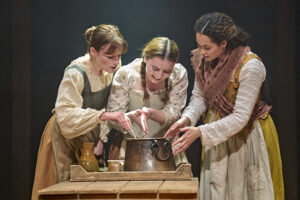Jessica Harris has a mixed response at the Swan Theatre.
The challenge of turning a novel into a stage production lies, so often, in choosing what to exclude, as much as what to include. Lolita Chakrabarti’s adaptation of Maggie O’Farrell’s book, Hamnet, has given itself an extra challenge: as well as including most of O’Farrell’s themes, the character of Shakespeare has a far bigger role than in the novel.
The result is a play which tries to do too much in too short a time. Running at around two hours, some scenes of Hamnet feel hurried, without space for characters to emerge or for mood to develop.
Some aspects of the piece work better than others: the theme of parenthood and the differing experiences of childhood are well captured. William Shakespeare’s father, John, is portrayed as angry and violent towards his son, whilst Joan, stepmother to Agnes (the name by which Anne Hathaway was known) is characterised as mean spirited and vicious-tongued. The contrast between their parenting, and that of Agnes and William, shown as being deeply loving and caring of their children, gives the play much of its emotional content.

But the decision to introduce the character of Hamnet only at the end of the first act reduces the potential for dramatic impact and underplays another theme – that of Agnes’ psychic abilities. Whilst Agnes is described as being a seer, in contact with her dead mother and aware that she will only have two children (at odds with the fact that her firstborn, Susanna, is followed by the birth of twins, Hamnet and Judith), the absence of Hamnet for much of the play diminishes the sense of foreboding about his eventual fate.
One of the joys of O’Farrell’s novel is the insight it gives into the lives of ordinary people. The world of John, as a glover, is brought well to the stage, with his tools, his knowledge of skins, production and sales, and his frustration with his lack of social status. The world of women is also there, from horticulture to housewifery, from caring for children to tending livestock. But sometimes the potential of these scenes for insight and intimacy is lost, crowded out by the sheer business of what is happening on stage. Characters run in and out, set and props are constantly changed. At times, it feels more like Friday rush hour than a domestic interior of the late 16th century.
Chakrabarti’s choice to enlarge the role of Shakespeare allows more to be shown of him carving out his career as actor/playwright and provides levity as his actors take to the stage, mounted on top of the stage we are viewing. It also gives depth to the schism between him and Agnes, resulting in a second act which is emotionally stronger than the first. With William in London, Agnes grieves the death of Hamnet from the plague, feeling abandoned and alone.
O’Farrell’s ending, followed by Chakrabarti, provides a somewhat sugary feel-good factor. Agnes, needing to understand her husband’s apparent indifference to the death of their son, heads for London to see his new play Hamlet. As she watches, she understands that, in writing this piece, her husband has wanted to offer up himself to death in the place of his child.
There are some strong performances in this production. Madeleine Mantock, as Agnes, excels in her emotional portrayal of grief. Tom Varey, as William Shakespeare, grows into the role of the older Shakespeare. Peter Wight, as John, gives a powerful performance of anger and of a thwarted life.
But, somewhat limited by a script which is overly literal and by too much fuss on stage, this adaptation of Hamnet but doesn’t quite convey the lyricism and atmosphere of O’Farrell’s novel.
Hamnet was directed by Erica Whyman. It runs at the Swan Theatre, Stratford until 17th June. For further information visit rsc.org.uk.
Pics – Manuel Harlan.


